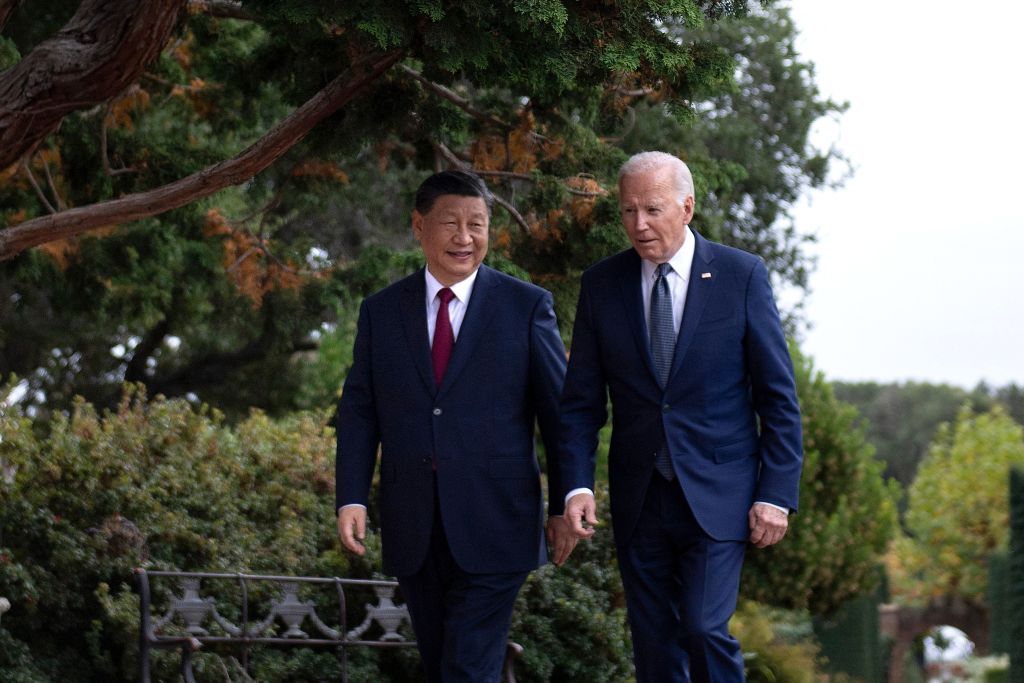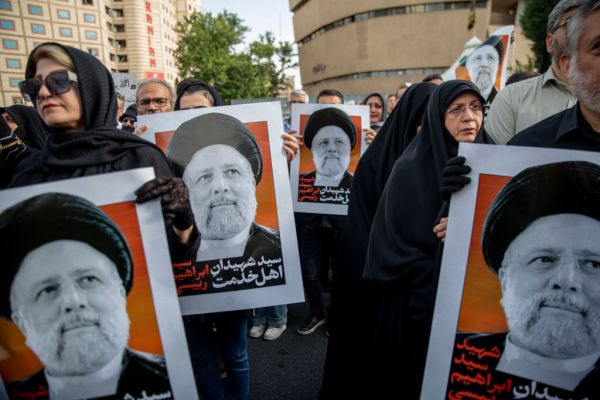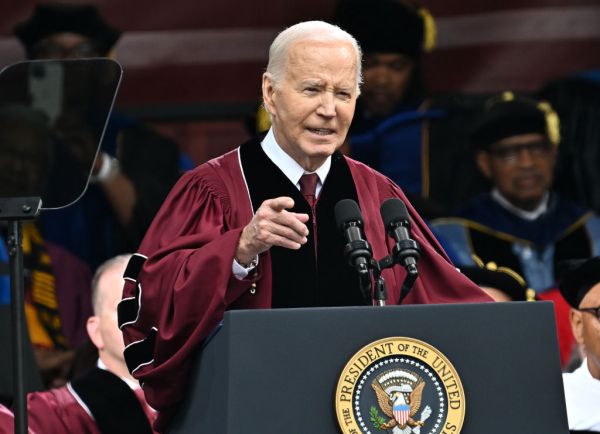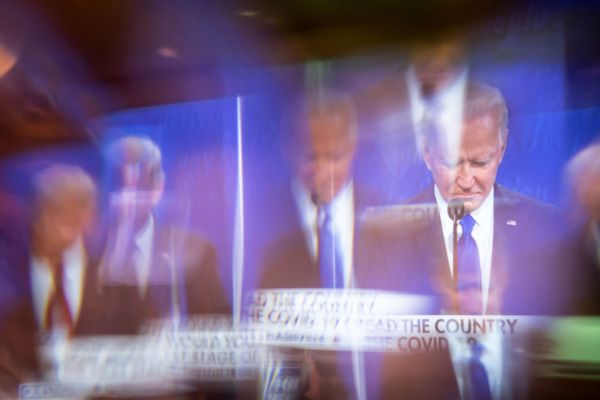Happy Thursday! As you and yours begin to put together your Christmas lists this year, let us offer a little unsolicited advice. A recently sterilized hippopotamus—descended from the very creatures brought to Colombia by the late drug kingpin Pablo Escobar—will not do.
Quick Hits: Today’s Top Stories
- President Joe Biden and Chinese President Xi Jinping met Wednesday for the first time in a year at the Asia-Pacific Economic Cooperation (APEC) summit in San Francisco and held conversations in which—according to Biden—“real progress” repairing their relationship was made. The White House announced a resumption of military-to-military communications with China, as well as a bilateral agreement to combat illegal drug trafficking and a shared commitment to working together to tackle climate change. Still, Biden underscored the divide that remains between the two leaders. “Well, look, he’s a dictator in the sense that he is a guy who runs a country that is a communist country that’s based on a form of government totally different than ours,” Biden said in a press conference after the meeting. “Anyway, we made progress.”
- The International Atomic Energy Agency (IAEA) reported Wednesday on Iran’s nuclear activity, detailing the growth in the country’s weapons-grade enriched uranium stockpile. The report—shared confidentially with IAEA member states and seen by the Associated Press—said that Iran has an estimated 128.3 kilograms of uranium enriched to 60 percent purity, an increase of 6.7 kilograms since the September report. The current stockpile—once enriched to 90 percent purity—could fuel three nuclear weapons.
- A U.S. Navy destroyer in the Red Sea on Wednesday shot down a drone headed toward the ship. Military officials say the drone originated from Yemen, but did not indicate whether the Houthi rebels were responsible. “The [USS Thomas] Hudner’s crew engaged and shot down the drone to ensure the safety of U.S. personnel,” the Defense Department said in a statement. “There were no U.S. casualties or any damage to the ship.” Last week, the Houthis shot down a U.S. MQ-9 Reaper drone over the Red Sea.
- Former President Donald Trump’s lawyers on Wednesday requested a mistrial in the New York civil fraud case involving Trump’s real estate and financial statements, citing a “tangible and overwhelming” bias against their client. “Given the demonstrable partisan bias present on the bench at trial, the only way to maintain public confidence in a truly independent and impartial judiciary and the rule of law is to bring these proceedings to an immediate halt,” Trump’s attorneys wrote in their filing. Judge Arthur Engoron, who presides over the case and will ultimately rule on a mistrial, gave the New York attorney general’s office until Thursday to respond to the request.
- Retiring Sen. Joe Manchin of West Virginia said Wednesday that he is “absolutely” considering running for president in 2024 and will travel the country in the coming months to see if there is a desire for a moderate option in the presidential contest. “I’m totally, absolutely scared to death that Donald Trump would become president again,” Manchin told NBC News. Manchin also addressed concerns that he could siphon votes away from President Joe Biden. “I’ve never been a spoiler in my life of anything,” he said, “and I would never be a spoiler now.”
- Former New Jersey Gov. Chris Christie announced Wednesday that he had met the donor threshold—80,000 unique individuals—to qualify for the fourth GOP presidential debate to be held at the University of Alabama on December 6. His campaign pointed to two national polls where Christie met the 6 percent polling threshold, but it’s unclear if the Republican National Committee will accept the polls as valid to fulfill the qualifying criteria. Trump, Florida Gov. Ron DeSantis, former U.N. Ambassador Nikki Haley, and businessman Vivek Ramaswamy also appear to have qualified for the upcoming debate—though it is once again unlikely that Trump will participate.
- New Jersey first lady Tammy Murphy announced yesterday that she will run to unseat Democratic Sen. Bob Menendez in 2024. Murphy joins Rep. Andy Kim as the second well-known Democrat in the state to challenge Menendez in the wake of the senator’s indictment on bribery charges.
Post-Panda Diplomacy

Striking up a conversation with someone you haven’t spoken to in a year can be a little awkward under any circumstances, but it’s probably worse if that person also flew a spy balloon over your country and took your pandas.
Chinese President Xi Jinping and U.S. President Joe Biden met on Wednesday on the sidelines of the Asia-Pacific Economic Cooperation (APEC) summit in San Francisco—their first meeting in a year—in an effort to mend a relationship that has deteriorated in recent months. Biden announced modest agreements on several issues during a solo press conference following the summit, including the resumption of some military-to-military communications, cooperation to stem the flow of fentanyl precursor chemicals and pill presses to the Western Hemisphere, and setting guardrails around military applications of artificial intelligence. But despite limited success around the edges of the relationship, intractable disagreements—like the reality of China’s aggressive posture toward Taiwan—remain.
The last time Biden and Xi spoke was in November 2022 during a three-hour meeting in Bali, Indonesia, at a Group of 20 leaders summit. That tête-à-tête was colored by discord over Beijing’s suspension of communications with the U.S. military in retaliation for then-House Speaker Nancy Pelosi’s August 2022 visit to Taiwan—a self-governing island China claims as its own—and relations between the two countries only worsened from there. In February, the U.S. shot down a Chinese spy balloon after it traversed the entire North American continent, causing Secretary of State Antony Blinken to cancel a planned visit to Beijing.
But the balloon wasn’t the only instance of reported Chinese spying in the last 10 months. This past April, federal prosecutors pressed charges against two men accused of running a Chinese police outpost in New York City aimed at intimidating Chinese dissidents living in the U.S. The next month, the world learned of the existence of a Chinese listening station in Cuba, which almost scuttled Blinken’s rescheduled trip to Beijing. Over the summer, the U.S. government discovered a widespread Beijing-directed hack of unclassified State Department computer systems and those of key figures managing the U.S.-China relationship in the Biden administration, including Commerce Secretary Gina Raimondo (whose department is behind export controls on various Chinese goods). Separately, prosecutors in August indicted two U.S. sailors stationed on naval bases in California for sharing sensitive military information—including the specs of ships and plans for U.S. military exercises in the Indo-Pacific—with their Chinese handlers in exchange for cash bribes. Only days after the indictments, a flotilla of 11 Russian and Chinese ships came shockingly close to U.S. sovereign waters off the coast of Alaska’s Aleutian Islands.
The provocative patrol was itself part of a much larger trend of risky Chinese military maneuvers involving U.S. military planes and vessels. Last month, the Pentagon declassified the details of more than a dozen “coercive and risky” maneuvers by Chinese People’s Liberation Army (PLA) pilots against U.S. aircraft since the beginning of 2022, including encounters that had Chinese jets some 10 feet away from American planes performing lawful flights in international airspace. Several PLA ships have cut it similarly close with U.S. vessels in international waters, and last month a Chinese vessel rammed a Filipino coast guard boat and a supply ship bound for a contested shoal—in the Filipino exclusive economic zone but which China claims—in the South China Sea.
Amid all of this activity, the Biden administration spent the summer performing a diplomatic blitz to try to get the relationship back on a stable footing. Blinken, Raimondo, Treasury Secretary Janet Yellen, CIA Director William Burns, climate envoy John Kerry, and others at lower levels of the federal bureaucracy made trips to Beijing that seemed to yield few concrete results.
At the outset of Wednesday’s meeting, the two leaders seemed to still be on different pages about the very nature of their countries’ relationship. “We have to ensure that competition does not veer into conflict,” Biden said. Just moments later, Xi remarked, “I am still of the view that major-country competition is not the prevailing trend of current times and cannot solve the problems facing China and the United States or the world at large.”
If they were talking past each other when the meeting started, Biden suggested in a solo press conference following the bilateral summit that the two had nevertheless reached some agreements, calling their discussion their most “constructive and productive” yet—even as he later referred to Xi as a “dictator.”
China curtailing military-to-military communications had proved a vexing issue for the Biden administration, especially as Chinese jets and vessels instigated near-miss after near-miss with U.S. planes and ships, increasing the likelihood of a serious mishap. But Wednesday, Biden announced the resumption of communications between the Pentagon and Chinese defense ministry, including eventually at the defense secretary and defense minister level. Defense Secretary Lloyd Austin is currently without a counterpart after the previous defense minister, Li Shangfu, was removed last month with little official explanation.
The Chinese reversal—more than a year in the making—could be a course correction after the U.S. proved less risk-averse in international waters and airspace than originally estimated. Beijing may have previously assumed that, “if they make the cost high enough [to operate in the region], that it would change the calculus for either the U.S. or its allies in the region,” explained Jeremy Chan, a China and geopolitics analyst at the Eurasia Group. “If they thought that this was going to drive out the U.S. and its allies from the theater, they have been in for a rude awakening.”
But the importance of reestablishing those crisis hotlines could be overstated. “It’s something that’s good to have—talking to one another is better than not talking,” David Sacks, a fellow for Asia Studies at the Council on Foreign Relations, told TMD. “But we have fundamentally different conceptions of what military-to-military talks are and what they should be used for. And that’s not going to change. So if there is a crisis between the United States and China, I wouldn’t bet on anybody picking up the phone on the other end.”
Biden also announced the pair had agreed to reestablish counternarcotics cooperation—which China originally halted after Pelosi’s August 2022 Taiwan trip—on fentanyl, the potent synthetic opioid responsible for 107,000 American deaths in 2021. The Biden administration is looking to encourage Beijing to crack down on companies that export fentanyl precursor chemicals and counterfeit pill presses that disguise fentanyl-laced drugs as legitimate medications to Mexico, the largest exporter of fentanyl to the U.S. Though publicly released details on how the Biden administration’s plans are thin, several outlets reported they may include lifting some restrictions placed on China’s Institute of Forensic Science. The Commerce Department in 2020 placed the institute on its so-called “entity list,” which functionally barred it from receiving any U.S. exports, for what the U.S. considers the institute’s involvement in persecuting Uyghurs and other minorities in China. After a bipartisan delegation to China last month, GOP Sen. Bill Cassidy told The Dispatch’s Haley Byrd Wilt that Chinese officials were adamant sanctions on this agency be lifted before any progress on fentanyl was made.
But Sacks, the fellow at the Council on Foreign Relations, doesn’t see yesterday’s agreement as likely to last. “This is something that China clearly views as a favor that it gives to the United States,” he told TMD. “That’s why China quickly suspended all cooperation on this issue after Speaker Pelosi visited Taiwan. And so, in that sense, if there’s another major kind of issue in U.S.-China relations, I would expect China to do the same thing again. So I think that all of these deliverables are quite fickle, and things that China will cancel and then kind of dangle again to resume them.”
Though Biden also touted setting up artificial intelligence guardrails as another area of agreement, the two countries—as well as 25 other signatories—had acknowledged the potentially “catastrophic” effects of the technology already this month at a summit in the United Kingdom.
The question remained whether Xi could be trusted to fulfill his end of the deal on these areas of purported agreement, given everything that’s happened in the last year alone. “Trust but verify, as the old saying goes,” Biden said during last night’s press conference, during which he often stumbled over his words and frequently seemed to be reading from cue cards.
While not at top of mind in Biden’s presser, the island of Taiwan—which Biden has several times said the U.S. would defend, in seeming contradiction of the U.S.’s own policy of “strategic ambiguity” on the question—is nonetheless a major sticking point in the U.S.-China relationship. Beijing has increased military and economic pressure on the island democracy—conducting exercises in the Taiwan Strait that runs between the island and mainland China—over the last several years, while Washington has increased its cooperation, including weapons sales, with Taipei.
Taiwanese presidential elections set to take place in January could ratchet up tensions even more. The current frontrunner, Vice President Lai Ching-te, who goes by the English name William, is more hawkish than his opponents and even than his own party’s president when it comes to the question of the island’s independence. “Lai Ching-te clings stubbornly to the separatist position for ‘Taiwan independence,’” the Chinese Foreign Ministry said of him earlier this year. “He is a troublemaker through and through.”
Biden himself was less explicit yesterday than he’s been in the past in affirming his support for the island, underscoring the U.S. “One China Policy,” which acknowledges the Chinese position. He dodged the question of whether the U.S. would defend the island—and that subtle shift may be noticed in Beijing and Taipei, Sacks argues: “If he doesn’t say it, it’ll be seen as a softening of the U.S. position on that, and raises questions about U.S. resolve and, in my view, weakens deterrence.”
The disconnect between the U.S. and China on the question of Taiwan may illustrate how the meeting was only able to nibble around the edges of the problems in the bilateral relationship. Even if the meeting temporarily succeeded at lowering the temperature between the two countries, American and Chinese leadership remain far apart on a host of vital issues. “When you look at any of the major geopolitical issues in the world, we’re on opposite sides of pretty much all of them,” Sacks said. “And that’s not going to change because of this meeting. China’s not going to stop supporting Putin, and China’s not going to stop its coercion of Taiwan, and it’s not going to stop supporting North Korea. I think that’s just a fact of life, and it will be for the foreseeable future.”
Worth Your Time
- Kite & Key’s latest explainer video envisions a world in which China has launched an invasion of Taiwan, and wonders if the United States’ military is adequately equipped to respond: “In several wargame simulations of the conflict, America lost. In the more optimistic ones … we fought to a stalemate. How did we get here? First, there’s the matter of our military hardware. The Navy, for instance, is so backlogged on maintaining its fleet that it’s the equivalent of 15 ships being out of service each year. Then there’s the question of manpower. The Army, Air Force, and Navy are all falling short of recruitment goals. And that’s all before we get to the fact that even the Pentagon admits that China has surpassed the U.S. on several important measures of military strength. Where does that leave us? Vulnerable.”
Presented Without Comment
White House pool report: “Biden wished Xi’s wife a happy birthday—she and Biden share the same birthday. Xi said he was embarrassed, had been working so hard and had forgotten that his wife’s birthday was next week. He thanked Biden for reminding him, per the [senior administration official].”
Also Presented Without Comment
NBC News: Police and Pro-Palestinian Demonstrators Clash at DNC Headquarters
Also Also Presented Without Comment
Bloomberg: Half of Russians Want Putin to End War in Ukraine, Poll Shows
Toeing the Company Line
- In the newsletters: Scott explored (🔒) the demographic challenges of our aging population, the Dispatch Politics crew covered the beginning of Dean Phillips’ presidential campaign in New Hampshire, Jonah argued that (🔒) calls for a ceasefire implicitly support Hamas, and Nick unpacked (🔒) how Kevin McCarthy is dealing with the loss of the speakership.
- On the podcasts: Jonah is joined by Alexandra Hudson on The Remnant to discuss her new book, The Soul of Civility: Timeless Principles to Heal Society and Ourselves, Sarah and David respond to comments on Bari Weiss’ Federalist Society speech and discuss the new SCOTUS ethics code, and Steve and Sarah return to their bet on the latest episode of High Steaks (🔒).
- On the site: Bennett Murray, reporting from the trenches outside Bakhmut, explains how do-it-yourself (DIY) tech is changing the battlefield in Ukraine and Emma Rogers breaks down how U.S. oversight of Ukraine aid works.
Let Us Know
Should the Biden administration continue its attempts to thaw relations with Xi’s government? Do you think a larger conflict between China and the United States is inevitable?









